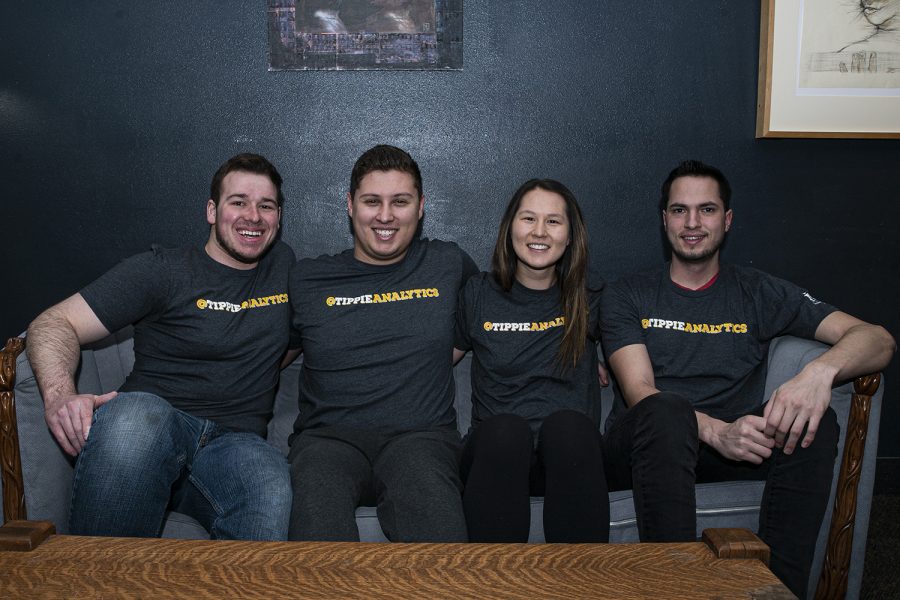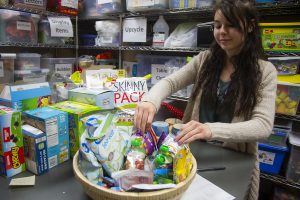UI students team up with Mandela fellow to help Botswana pharmacy
Three different groups of University of Iowa students worked over the course of three academic semesters to use their knowledge in information systems to create an application for a pharmacy in Botswana.
The Botswana Pharmacy development team members, Isaac Perrilles, Alec Kozakowski, Karina Diekema, and Alex Schmertmann pose for a portrait in Java House in downtown Iowa City on Friday, February 21st, 2020. Team member, Travis Geisler is not present.
February 24, 2020
A University of Iowa Information Systems capstone project has connected students with a Mandela Washington fellow to create an application to help his Botswana-based pharmacy and spark the possibility of benefiting the entire country’s public health.
The project began in spring 2019 when the first “phase” of students involved spoke with 2018 Mandela Washington fellow Rapula Otukile about his pharmacy’s needs and the problems it was facing, said Carli Strathman, a member of the project’s phase-two group.
Strathman said that Otukile voiced his need for an affordable, inventory-track management system that was able to specify when shipments came in, when they were dispensed, and if expired shipments needed to be thrown out. Based on his requests, she said, the first-phase group created a portion of the application’s code before handing the project off to the second-phase group at the end of the spring 2019 semester.
After creating a database and running various tests on southern African servers to see if the country’s bandwidth would support the application, Strathman said, the group traveled to Botswana in November to implement the system. The application is successfully running but improvements will be implemented by the phase-three group to optimize it according to Rapula’s feedback, she said.
“I think when you’re given a semester time frame, there’s only so much that you can do, which is the coolest part about this project because we got it to work and to do the bare minimum of what Rapula asked, but now that he sees what we did, he can see what would enhance it more,” Strathman said. “That’s what’s going to make this project be able to go semester to semester, and I can’t wait to see what these students this semester can do to make this app even better.”
RELATED: UI to welcome Mandela fellows this summer
UI senior Karina Diekema, a member of the spring 2020 team, said that phase three aims to make the application faster and more user friendly for the pharmacy staff. They’re focused on inputting less data on a page to speed up overall loading, allow multiple drug reports from an order to be registered in the system at once, send weekly reports of when drugs are nearing expiration, and create a customer-order system and manager dashboard, she said.
Moving forward, Diekema said she is excited to see where the project continues to go — specifically on the issue of drug expiration.
“Rapula and the pharmacy lose a lot of money in expired drugs because they can’t use them anymore and have to throw them away, so being able to make a system where it’s easy to tell when drugs are about to expire gives them the full use of their orders,” she said. “I can [imagine] how that’s going to help them economically as well as not wasting the drugs because they are very valuable and can really help people.”
The team aspires to bring the application on a broader scale to benefit the country’s public health as a whole, said Tippie College of Business business-analytics lecturer Kristy Walker. While in Botswana, the team met with members of the U.S. Embassy and individuals associated with public health for the country, she said, and currently they’re looking at logistics for implementing the same application to track free HIV drugs to the villages.
Otukile said that the application has been successful so far, and he’s excited to see where it can go further with phase three’s teamwork and improvements. He said he enjoyed the time commitment to the work that those involved demonstrated.
“With the previous group we had a weekly meeting for most of the semester and sometimes I remember, because of the time differences, some of them had to be after about 4 a.m. your time to actually be part of the call,” he said. “That really moved me because I then realized that they’re actually quite committed to us and the project. I’m looking forward to [working with this new team] — there’s quite a bit of diversity in the team’s dynamism and we share a lot of ideas.”







